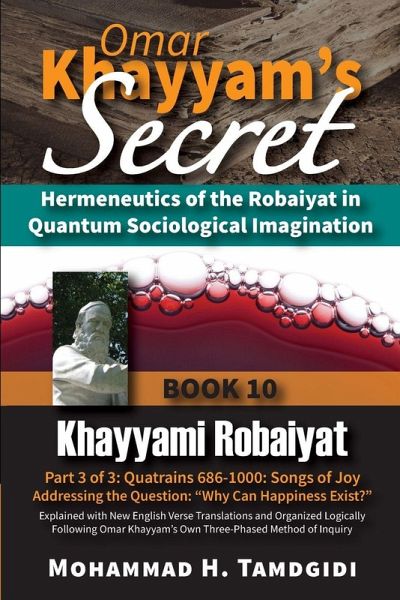
Omar Khayyam's Secret
Hermeneutics of the Robaiyat in Quantum Sociological Imagination: Book 10: Khayyami Robaiyat: Part 3 of 3: Quatrains 686-1000: Songs of Joy Addressing the Question "Why Can Happiness Exist?": Explained with New English Verse Transla
Versandkostenfrei!
Versandfertig in 1-2 Wochen
78,99 €
inkl. MwSt.

PAYBACK Punkte
39 °P sammeln!
Omar Khayyam's Secret: Hermeneutics of the Robaiyat in Quantum Sociological Imagination, by Mohammad H. Tamdgidi, is a 12-book series of which this book is the 10th volume, subtitled Khayyami Robaiyat: Part 3 of 3: Quatrains 686-1000: Songs of Joy Addressing the Question "Why Can Happiness Exist?": Explained with New English Verse Translations and Organized Logically Following Omar Khayyam's Own Three-Phased Method of Inquiry. Each book, independently readable, can be best understood as a part of the whole series. Tamdgidi shows that the quatrains 686-1000 address the question "Why Does (or Ca...
Omar Khayyam's Secret: Hermeneutics of the Robaiyat in Quantum Sociological Imagination, by Mohammad H. Tamdgidi, is a 12-book series of which this book is the 10th volume, subtitled Khayyami Robaiyat: Part 3 of 3: Quatrains 686-1000: Songs of Joy Addressing the Question "Why Can Happiness Exist?": Explained with New English Verse Translations and Organized Logically Following Omar Khayyam's Own Three-Phased Method of Inquiry. Each book, independently readable, can be best understood as a part of the whole series. Tamdgidi shows that the quatrains 686-1000 address the question "Why Does (or Can) Happiness Exist?" The question is the third of a set of three methodically phased questions Khayyam has identified in his philosophical works as being required for investigating any subject. The order in which the quatrains are presented shows that the quatrains included in Part 3 continue the logically deductive reasoning process started in Part 2, but serve as practical examples of how humankind can turn the activity of poetry writing itself as a source of joy in life when confronting the topics of death, survival, and spiritual fulfillment. The thematic topics of the quatrains of Part 3 as shared in Book 10 are: XVIII. Garden; XIX. Wine; XX. Love; XXI. Night; XXII. Death and Survival; XXIII. Liberation; and XXIV. Return. Khayyam's overall sentiment in pursuing the inquiry in the third part of his book of poetry is expressive of joy. He begins by showing, using the example of his own poetry, how strolling in a garden offers opportunities to enjoy it even when writing about the transient nature of the roses and greens. He then offers in the longest section of his book a set of quatrains in praise of Wine, disguising therein a praise of the joy of writing his own poetry, Wine's metaphorical double-meanings offering chances in the here-and-now of stealing joyfulness even when mistreated by his foes and amid feelings of helplessness in confronting physical death. He then turns to the topic of spiritual Love, signifying the role the sentiment of Love in search of the Source of creation plays in the evolutionary process of the succession order of the created existence as discussed in his writings. He continues to the topic of death and the possibility of lasting spiritual survival and existence by practically encouraging the Drinkers of the Wine of his poetry itself to help bring about that end. He ends the Wine of his poetry by expressing how it has helped free himself from the prior (in Part 1) doubtfully expressed inevitability of physical death in favor of not just hopefulness (in Part 2) but the certainty of having initiated a lasting spiritual existence by way of the bittersweet Wine of his poetry itself, celebrating a return to the spiritual Source of all existence as woven into the 1000-threaded wick of the candle of his Love for God. We should therefore judge each step of the third part of Khayyam's poetic inquiry in consideration of the two other parts of his book of poetry, those already shared in Books 8 and 9 addressing the questions "Does Happiness Exist?" and "What Is Happiness?"


